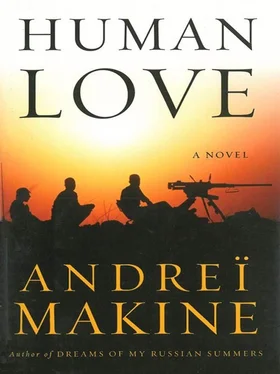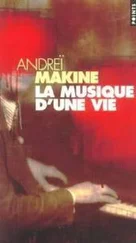Wholly immersed in her role as a rebel on the run, she gave herself, enjoyed more intense pleasure than ever, thanks to this game, and grew bolder. It was the actress in her that drew him down onto the floor of her room, let herself be ravished there on the ground, amid cigarette ends and the scattered drafts of her articles. It was the make-believe revolutionary who clawed at his belly, moaning and biting her lip, flung herself onto her back in the posture of one crucified, feigning now the self-abasement of a submissive lover, now the mechanical stubbornness of a female slow to be satisfied.
Until very recently these carnal games had flattered him. What he had beheld in the woman’s distraught look, her wild eye, was the reflection of his own virility, the black gleam of his sweating skin, the mark of his new status: he, the African, was servicing a well-known journalist, a white woman who was on close terms with the Cuban leaders and Castro himself.
That evening these masks struck him as a hollow sham. But, to crown it all, he realized that it had been a hollow sham from the start.
Louise stirred on the floor, stood up, still drugged with pleasure, and staggered toward the bed. Comically, a page of typescript clung to her right buttock. Elias stretched out his arm, detached the page, and by the light of a bulb suspended over a typewriter glimpsed this sentence: “Every revolution is at risk from two dangers: the gangrene of bureaucracy in its leaders and the recurrence of petty bourgeois instincts in the workers.” The sickly sweet smell of corn as well as that of fried fish, pungent and oily, floated in through the bedroom window. The alimentary instincts of the petty bourgeoisie, thought Elias, smiling in the dim light.
And she did indeed start to talk about how the revolutionaries of twelve years ago were being visibly tempted today by the siren voices of Florida. “A lack of political consciousness… The American influence… The lure of the dollar…” The sense of her words should have called for brisk, severe tones. But the woman was torpid after her physical exertions and nestled up to the man with the abandon of any romantic young mistress.
He already knew how the evening would go. The impassioned revolutionary, having become a languid lover, was going to mutate into a good Western tourist, with an expert knowledge of picturesque Havana. She would take him out to their “favorite” restaurant, order their “favorite” dishes, greet their “favorite” chef… She would have done the same in Provence, in China, in Senegal.
A Frenchwoman who knows how to explore the local attractions. Revolutionary tourism, he thought, surprised, himself, by the aptness of the phrase.
The dinner began as expected. Except that this time Elias was waiting for an opportunity at last to tell the truth. And this anticipation made the setting seem increasingly artificial: the sea breeze with its “faint whiff of iodine,” as Louise always remarked, the sugary strumming of a guitar, the momentary fire of the rum.
He did not know where to start. Perhaps with the falsity of the parts they were playing – she a tourist in the zoo of revolution, he the symbolic negro breaking the shackles of slavery. Or should he talk to her about the “Che” he had known? Describe him as he had appeared in Africa, a real man still, with all his fears and weaknesses? Yes, tell her the story of just that night amid drunken soldiers laying siege to their “command post.” Tell her how Che and the Belgian woman had fled, frightened by the devastating chaos that prevailed in the bestiary of African revolutions. Say to her, “You’ll cut and run, too, when you’ve had enough. And I’ll end up in your notebook, among the other trophies, a brief episode in your tourist expedition. Yes, my negro’s head hung on the wall in your drawing room, between a Parisian anarchist and a Cuban barbudo
The image of it struck him as comic. He smiled and noticed then that they had both been silent for a moment, casting wary glances at one another and knocking back their rum with equal wariness. Louise had a harsh, scornful grimace. He had a fervent desire to reclaim from this woman all that she had had from him: their nights together, his African body, which she had added to her collection… He again pictured his head as a hunting trophy and realized the extent to which all this was unimportant: his inveighing against the Westerners’ revolutionary safaris, his bouts with Louise in theatrical secrecy, the pleasure this big child had taken, having indeed come here in the hope of indulging in sex, spiced with battles and impassioned speeches… He felt so little involved in this vortex of words and deeds, of the ebb and flow of passions. The essential thing was still that child hiding a wounded bird inside his shirt, a child who found the world’s perfection in the fold of his mothers arm… If only he could tell her about that!
He looked up and suddenly became aware that Louise was talking, or rather muttering, in inebriated but lucid tones, and that she was saying precisely what he had been preparing to declare. “Che s soon going to turn into a mascot, a caricature, a label… Do you think I don’t understand that? But people need something to believe in… Otherwise it’s, you know, Orwell, Kafka… Besides, who could replace him? Fidel? A man who goes on jabbering for hours in his sleep? Our European revolutionaries? They never venture farther afield than the last stop on the metro… Go ahead. Tell me, if that’s what you think. Tell me I’m just like them. A spoiled young bourgeoise. Cruising the world to get screwed by guys with ebony skins hung like stallions… You owe it to yourself to think that, don’t you? And what’s more, I’m this hooker who’s trying to get herself a CV to match the bare-breasted girl on the barricades.”
Her tone began to waver, now aggressive, abusive of herself and others, now helpless and tender. She talked about a blind dog she had in Paris, confessed to having betrayed it by going away to make “her little revolution.” Then, without transition, declared: “But did you know the Cuban leaders are hiding the journal Che kept in the Congo? His notebooks. Not the notes that have been published… I’ve tried everything to get my hands on them. Its a state secret, you know! But I did find out from a Frenchman with contacts close to Castro that there was a fragment headed, ‘When Revolutions Die/ It sounds as if he was talking about the Cuban revolution. All those leaders. They’ve started to stink of rancid archives…”
She was almost shouting. Then, when Elias managed to take her out, to escort her home, she wept and babbled with the pitiful and touching incoherence of a drunken woman, whom one would like simultaneously to fold in one’s arms and to slap. She said her father had “the look of someone who’d been in the OAS;” that her mother’s life was “as lively as a barnacle;” that it was better “to be wrong with Sartre;” that her grandmother recited poetry to her flowers and was the only honest person in their family; that power grew “out of the barrel of a gun.” Finally, in a quavering avowal, she denounced the perfidy of a certain Jean-Yves, who had dumped her for a “fat German cow, a friend of Andreas Baader. But I’ll show him, that bastard. I’ll show him,” she gulped. “Here in Cuba, I’m going to…”
Her voice drowned in a sob. Elias drew her to him, cradled the head racked with shudders against his shoulder. As the veil of sleep descended, Louise was still murmuring, calling someone. Her blind dog left in Paris, Elias guessed.
That night was the only one where they felt truly close, liberated from the postures they had imposed on themselves. And for the first time Elias became aware of the paths that led human beings through revolutions and wars, through life. He grasped that within the most stubborn commitment to the most sublime cause could lie hidden the desire to punish a man who went off with a rival, the memory of an old woman who recited poetry to her window boxes, and pity for a dog.
Читать дальше









